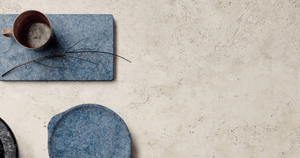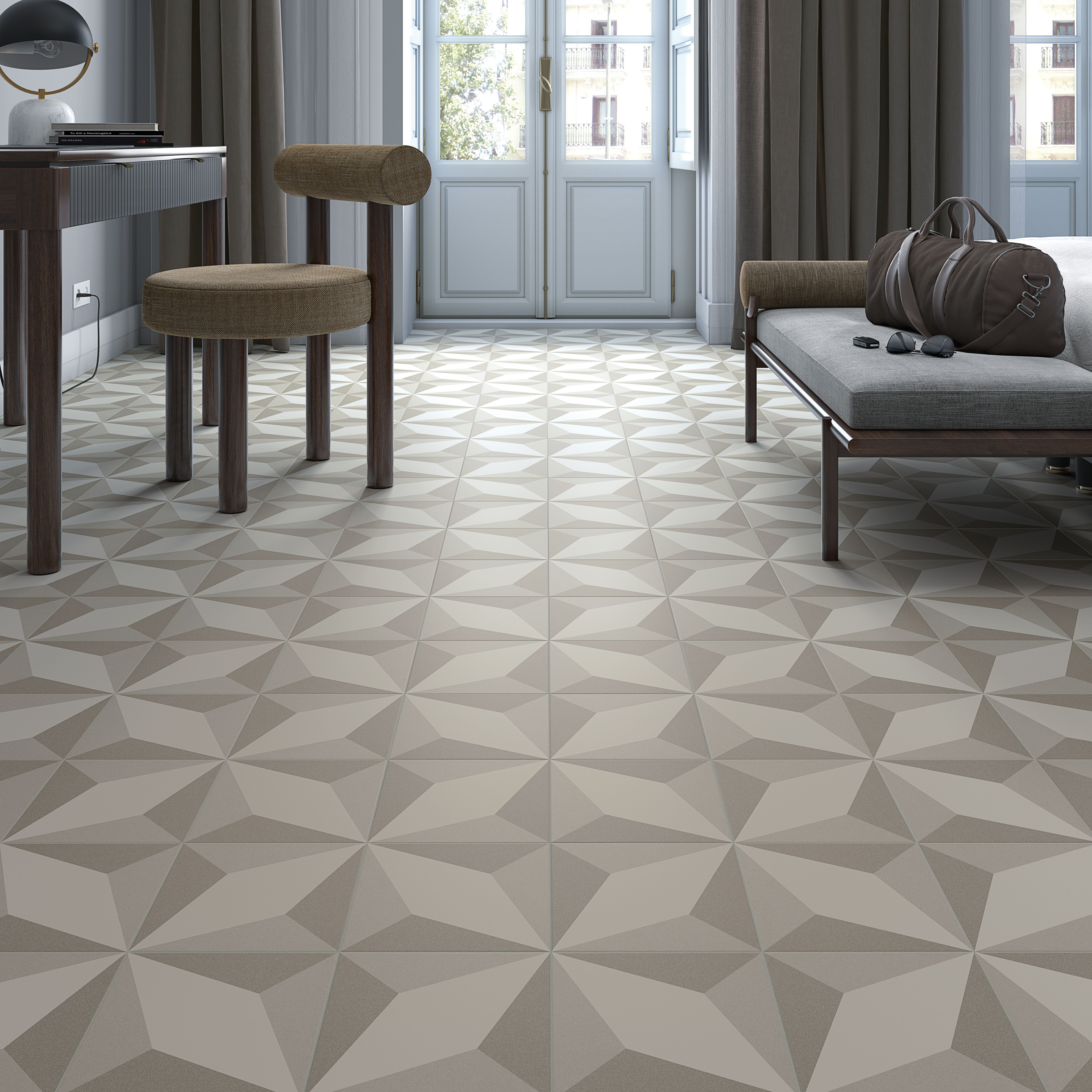20th Jan 2023
Travertine Stone vs Porcelain Tiles for Pool Decks - What’s Better?
If you're looking to renovate or install a pool deck, you may wonder whether travertine stone or porcelain tile is the better option. Both materials have pros and cons, so deciding which is right for you can be difficult. Our team of experts has created this travertine and porcelain tiles comparison guide to help!
We will discuss both materials' appearance, durability, lifespan, areas of usage, maintenance, damage repair, qualities, and costs. We'll also give you a recommendation for porcelain tiles from our range. So read on to find out more!
.
- What is the most durable surface for a pool?
- Are porcelain tiles more expensive than travertine?
- Travertine Stone
- Porcelain Tiles
- What is better, porcelain or travertine?
.
What is the most durable surface for a pool?
Porcelain outdoor tiles can also be a great option for pool tiles due to their durability and low maintenance requirements. Porcelain pool tiles are denser than travertine, so it is less likely to chip or crack over time. This makes it an excellent choice for pool coping because you won't have the same maintenance issues that come with travertine.
FEATURED GUIDE: The Beginner’s Guide to Pool Coping Tiles
.
Are porcelain tiles more expensive than travertine?
No, natural stones are more expensive than porcelain tiles. Porcelain is made of clay, whereas travertine is a natural stone. Porcelain tiles are designed to be cost-effective, so they can often be a more budget-friendly option than travertine.
.
Travertine Stone
Pros |
Cons |
|
- Unique and beautiful, natural stone look
- Easy to clean |
- Easily stained and etched by pool chemicals
- Requires sealing for protection - Higher Cost |
.
Appearance
.
Travertine tile has natural holes and troughs, giving it a distinct look and texture that makes it appealing. Travertine can come prepared in different ways, including honed, brushed, polished, tumbled, and saw cut, creating various looks. It also naturally occurs in shades from light to dark browns and beige.
.
Qualities
Travertine is a type of limestone and typically is sourced from quarries in Mexico, Turkey, or Italy. Travertine is a naturally occurring material made of calcite, making it extremely durable and long-lasting.
.
Durability
Travertine has a porous nature which means moisture and liquids can soak into your stones. Travertine stones must be sealed regularly to protect them from pool water damage. They are prone to staining and etching by pool chemicals and other materials without sealant.
.
Lifespan
Travertine tiles typically have a lifespan of 20 years or more when properly sealed and maintained. Regular maintenance is important if you want your travertine pool deck to last.
.
Areas of Usage
Travertine is primarily used for outdoor spaces, such as pool decks, patios and walkways. It can also be used indoors in bathrooms and kitchens, but it is not recommended for high-traffic areas due to its porosity.
.
Is travertine stone good around a pool?
Travertine can be used around a pool, but its porous nature means that it must be regularly sealed to protect it from stains and etching. It is also important to note that travertine can be slippery when wet, so they may not be the best choice if you have children or elderly people in your home who could slip.
RELATED GUIDE: The Beginner’s Guide to Non-Slip Outdoor Tiles
.
Costs
Travertine tiles can range in price depending on the type and quality you choose. Generally, travertine is more expensive than porcelain due to its natural stone look and feel.
.
Maintenance
Travertine requires regular sealing and cleaning to keep it looking its best. To clean travertine tiles, use a mild detergent or pH-neutral cleaner. Avoid using harsh chemicals or abrasive cleaners, as these can damage the stone's surface.
.
Damage Repair
If your travertine tiles become stained or etched by pool chemicals, they may need to be resurfaced or replaced. This can be a costly process and may require professional help.
.
Our Travertine Look Tiles
| Arena Cross Honey Grip | Navona Bone Cross Grip | Timeless Beige Grip |
.
Porcelain Tiles
Pros | Cons |
| - Low maintenance - Durable & long lasting - Budget-friendly option - Greater range of colours, shapes and sizes - Watertight | - Lacks the texture and feel of natural stone |
.
Appearance
Porcelain tiles come in various colours, sizes, shapes, and textures. This makes them a great choice if you're looking for something more customizable than travertine. They also have a smooth surface that can look modern and sleek when used as pool coping.
.
Qualities
While being an artificial material, porcelain tiles offer a great combination of characteristics such as low maintenance requirements, durability, and affordability. Because they are man-made, they are available in various colours, sizes and shapes, making them suitable for all types of pool decks.
.
Durability
Porcelain is a type of ceramic tile. It's made with dense clay, usually denser than ceramic, which helps makes it watertight and durable. Porcelain tiles are also denser than travertine, so they are less likely to chip or crack over time.
This makes them an excellent choice for pool coping surfaces because you won't have the same maintenance issues with porcelain as with natural stones like travertine.
.
Lifespan
Porcelain tiles are extremely durable and long-lasting. Porcelain tiles can last up to 75 years with proper care and maintenance, making them a great option for long-term investment.
.
Areas of Usage
Porcelain tiles are ideal for all wet areas around pools, such as decks and patios. They can also be used indoors in showers and bathrooms.
FEATURED GUIDE: 10 Stunning Pool Coping Tile Trends
.
Are porcelain tiles good around a pool?
B.I.S Grafite Grip | Industrial Stone
Porcelain tiles are an excellent choice for pool coping as they provide a modern and stylish look. Porcelain tiles are watertight and low maintenance, making them a great option for all wet areas around pools, including decks and patios.
.
Costs
Porcelain pool coping tiles are typically less expensive than travertine stones, so they may be a more budget-friendly option. You can find porcelain tiles in many different price ranges to fit any budget.
.
Maintenance
Porcelain requires minimal maintenance compared to travertine. Sealing porcelain tiles as you would with natural stones is unnecessary, but regular cleaning is important to keep them looking their best.
.
Damage Repair
If your porcelain tiles become stained or cracked, it is possible to repair them without replacing the entire tile. Porcelain can be refinished and restored if necessary.
.
What is better, porcelain or travertine?
Porcelain tiles offer a way to achieve a natural stone look for a fraction of the price.
When it comes to water and stain resistance, porcelain outshines. Travertine is fairly water and stain resistant when it is properly filled and sealed, but porcelain makes the most technical sense because of its lower absorption rate.
Get Some Inspiration For Your Pool Space Here
Ultimately; it comes down to personal preference between the two materials - so why not explore our range of porcelain tiles for yourself? Visit us in-store or shop online here!
.
At Tile Space, we understand that finding the right tiles for your project can be difficult. We are here to help you make an informed choice and provide recommendations for porcelain tiles from our range. With our extensive selection of products and knowledgeable staff, you can trust us to provide you with quality tiles that will last.
We look forward to helping you find the perfect tile solution for your next project!








































































